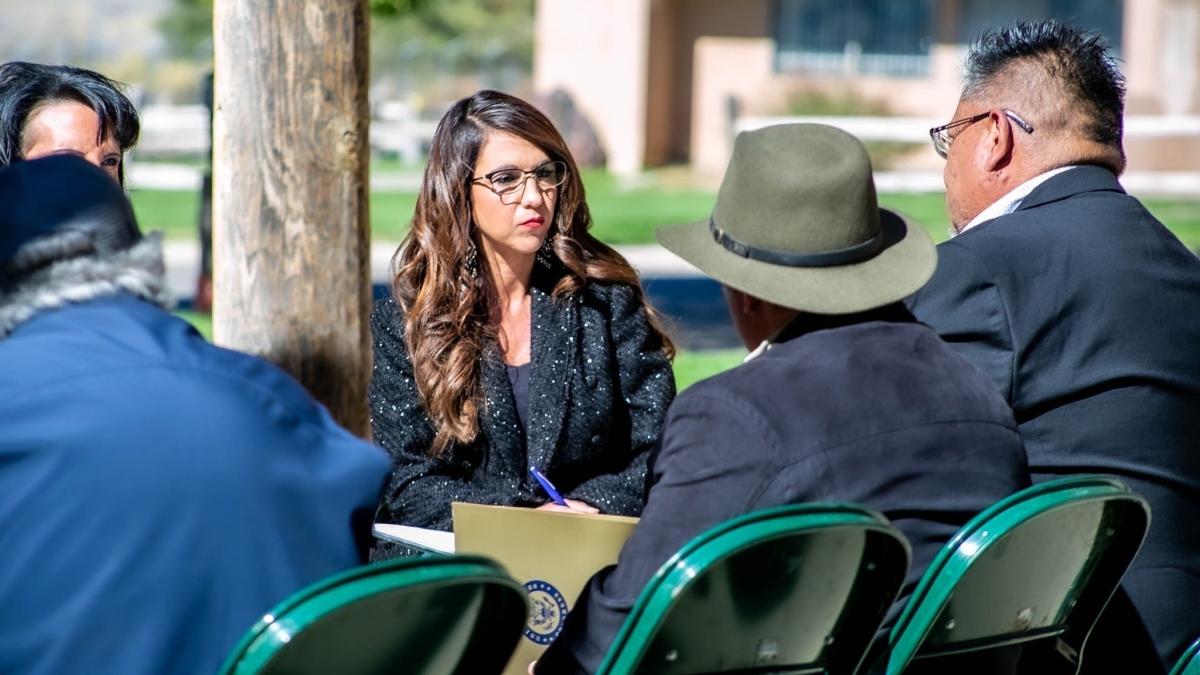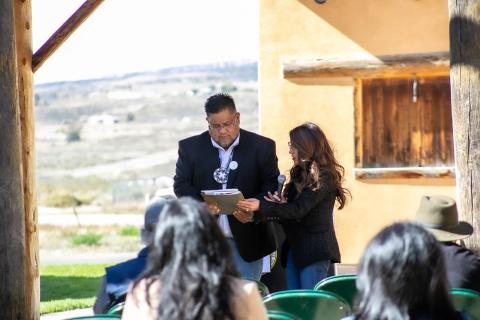Congresswoman Lauren Boebert Stands Up for Ute Mountain Ute Tribe and Defends Tribal Sovereignty and Property Rights

Congresswoman Lauren Boebert led an effort supporting the Ute Mountain Ute Tribe by urging the Bureau of Indian Affairs (BIA) to reexamine their determination letter restricting the Tribe’s efforts to restore tribal land.
Congresswoman Lauren Boebert stated, “The Bureau of Indian Affairs’ one-sided decision ignored the critical concerns of the Ute Mountain Ute Tribe. Instead of addressing the Tribe’s particular concerns regarding reservation land holdings, they gave the Tribe the bureaucratic run-a-round and relied on other irrelevant factors to make their detrimental decision. I am urging the Bureau of Indian Affairs to reconsider its decision.”
Ute Mountain Ute Tribal Council Chairman Manuel Heart said, “We really appreciate Congresswoman Boebert and her letter in supporting the Ute Mountain Ute Tribe. We have met with DOI in the past through the Solicitor’s office, and we feel that the Pinecrest Ranch is in Restricted Fee Status. Based on the original purchase of the Ranch and the settlement agreement with the Courts and the DOI. We went through the courts and there was a settlement agreement made on the mistake of ownership of the said Trust lands in New Mexico, between the Ute Mountain Ute Tribe and the Navajo Tribe. These lands purchased should have been put into the records of Ute Mountain Ute Tribal ownership from Trust to Trust instead of restricted fee or the current status of Fee Land. Thank you.”

Background:
Leading an effort to clarify a Bureau of Indian Affairs decision regarding the Ute Mountain Ute Pinecrest Ranch in Gunnison, Congresswoman Lauren Boebert sent a congressional oversight inquiry to the Bureau of Indian Affairs.
Congresswoman Lauren Boebert is actively working to advocate for Tribes in Colorado’s Third Congressional District:
- In a legislative provision signed in law, Congresswoman Boebert secured $10 million for the Indian Irrigation Fund to address the deferred maintenance backlog and increase water storage projects like the Southern Utes’ Pine River Indian Irrigation Project.
- Congresswoman Boebert introduced the House companion to the bipartisan Dolores River National Conservation Area and Special Management Area Act, which protects tribal water rights and allows for the continued use of the area for agriculture and other uses.
The full text of Congresswoman Boebert’s congressional oversight inquiry is available here and below:
Dear Secretary Haaland and Assistant Secretary Newland,
I write in support of the Ute Mountain Ute Tribe to request clarification of a June 9, 2022, letter to the Tribe by Patricia Mattingly, Regional Director of the USDI/BIA Southwest Regional Office. In this letter, the Bureau of Indian Affairs (BIA) asserts a determination that the parcels of land which comprise the Tribal-owned Pinecrest Ranch are “unrestricted fee land not subject to Federal restrictions against alienation.” This determination is contrary to the Ute Mountain Ute’s position that their Pinecrest Ranch Parcel 1 property in Gunnison, Colorado is owned in fee but subject to Federal supervision and restrictions against alienation.
I wish to raise several concerns regarding the BIA’s determination. The Bureau’s attempt to arbitrarily anchor Parcel 2 to Parcel 1 avoids a fair determination on Parcel 1 – which the Tribe purchased in trust to restore reservation lands. Rather than combining the parcels to tackle management challenges, the USDI/BIA should have taken a cooperative approach and facilitated a fair determination on the nature of Parcel 1. For example, it would likely be beneficial for the Tribe if they could simultaneously use and manage the reservation lands in Parcel 1 and be compensated for providing their own management (as permitted by Public Law 93-638). It goes without saying that the Bureau’s one-sided review unfortunately ignored critical Tribe-centric details.
The June 2022 letter failed to examine facts as they existed when the Tribe purchased Pinecrest Ranch, the various legal implications of the BIA’s actions at Pinecrest Ranch, and the trust relationship and consultation – as well as interpretations of current law – regarding restricted fee lands. Instead of addressing the Tribe’s particular concerns regarding reservation land holdings, the Bureau of Indian Affairs focused far too much on arbitrary and tangential case examples. For example, in the Lummi Tribe case referenced by the BIA, the Lummi Tribe was trying to regain reservation lands lost through unintended consequence of stewardship practices and private property sales by their membership. This example is not comparable to Tribal land purchased—such as the Pinecrest Ranch— to replace land taken by the federal government that the government was then unable to return.
In addition to finding fault with the BIA’s logic in the determination letter, it is also concerning that the Bureau is effectively weaponizing the use of certain words and phrases to benefit the Bureau’s apparent position. For example:
1. Reacquired lands (page 1, ⁋ 2, line 2): “The Tribe did not previously hold title to the property (e.g., it is not reacquired lands). . .” This seems to imply that only property which was previously owned/titled to the Tribe can qualify as reacquired lands.
a. Anchoring reacquired lands to only those physical parcels previously owned by a Tribe would seem to disadvantage a Tribe whose previously owned parcels were lost by action of the federal government and can therefore never be reacquired.
b. It’s indisputable that tribes have the right to acquire land, including for the reason of reservation restoration. Such purchases should have the same rights as a land exchange when the property is purchased from the funds held in trust.
2. Fee lands (page 3, ⁋ 2, last line): “Accordingly, the idea of restrictions on alienation with respect to fee land would not have been considered by Congress when passing the Non-Intercourse Act in 1834.” In this and other statements, the BIA effectively justifies its position by citing its own opinion that fee land is not qualified for restrictions on alienation. A more substantive foundation from the BIA would be welcome.
a. The BIA’s implication that the government’s lack of foresight in the 1834 Act would exclude fee land from the restrictions on alienation is arguably contrary to the overall principle of tribal land restoration on which the 1834 Act was written.
b. The BIA’s effort to define fee land as inapplicable to restrictions on alienation is also contrary to the 1953 Act referenced in the BIA’s letter, which clarified that purchased fee land will remain taxable.
The USDI/BIA have a duty to act in good faith and provide stewardship for the benefit of the Tribe and in honor of Tribal treaties. I request that you answer the following questions regarding the USDI/BIA process and approach in reaching their June 2022 determination:
1. On page 4 the BIA states that, “…to the best of our knowledge, Pinecrest was not reacquired lands…,” which seems to indicate a lack of investigation. What effort did the USDI/BIA make to cooperate with and collect relevant information from the Tribe before reaching the June 2022 determination? (See April 29, 1874: Agreement with the Ute Indians in Colorado, Sections 3-5, which define the Secretary of Interior’s responsibility to support, by review and investigation, and protect the Tribe in purchase of lands from funds held in trust.)
2. Why did the USDI/BIA choose to render a decision after the purchase rather than support the Tribe by assembling a commission to assist them? (Ratified US government agreement with Ute Mountain Ute Tribe dated May 1, 1888, Section 4.)
3. Is the USDI/BIA Southwest Regional office the appropriate venue and authority for making such an impactful determination, especially given this determination is contrary to the Tribe’s position?
There appears to be a disturbing lack of support from the government toward the Ute Mountain Ute Tribe’s general efforts to restore their Tribal lands. As the Member of Congress charged with representing all constituents of Colorado’s Third Congressional District, I submit this letter with reminder of past promises to Tribes and the government’s responsibility to serve the people, not rule over them. I do acknowledge Tribal and Federal government affairs are complex, and in recognition of that fact, voluntarily extend your duty to respond from 30 to 45 days. Thank you in advance for your review of these questions and concerns arising from the June 2022 letter from the BIA’s Southwest Regional Office. I look forward to your answers and clarifications.
Sincerely,
Lauren Boebert
Member of Congress
